Renewable Energy Company Founder
Mentor – David Jankowsky
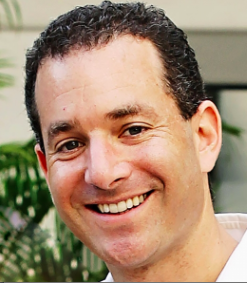 David started Francis Renewable Energy, LLC (FRE) in 2015 to provide solar, geothermal and other energy efficient systems for the residential, commercial and public sectors. Demand for renewables is growing because advances in the technology have reduced the cost of solar electricity and geothermal heating and cooling to the point where they are now more economic than systems using fossil fuels. Renewables are expected to gain an even greater cost advantage as the technology continues to improve. Renewables also offer the additional benefit of reducing pollution and carbon emissions in a meaningful way, while providing energy security by eliminating the use of the utilities’ transmission infrastructure, which we have seen is susceptible to hacking and other terrorist activities. Because of these advantages over fossil fuels, jobs in renewable energy are growing rapidly worldwide while jobs in the fossil fuel industry have been shrinking. The most recent US government employment survey in 2015 shows that more people had jobs in renewable energy than either coal or oil and gas, and total capital investment in renewable technologies for the first time in 2016 eclipsed total capital investment in the oil and gas sector.
David started Francis Renewable Energy, LLC (FRE) in 2015 to provide solar, geothermal and other energy efficient systems for the residential, commercial and public sectors. Demand for renewables is growing because advances in the technology have reduced the cost of solar electricity and geothermal heating and cooling to the point where they are now more economic than systems using fossil fuels. Renewables are expected to gain an even greater cost advantage as the technology continues to improve. Renewables also offer the additional benefit of reducing pollution and carbon emissions in a meaningful way, while providing energy security by eliminating the use of the utilities’ transmission infrastructure, which we have seen is susceptible to hacking and other terrorist activities. Because of these advantages over fossil fuels, jobs in renewable energy are growing rapidly worldwide while jobs in the fossil fuel industry have been shrinking. The most recent US government employment survey in 2015 shows that more people had jobs in renewable energy than either coal or oil and gas, and total capital investment in renewable technologies for the first time in 2016 eclipsed total capital investment in the oil and gas sector.
David chose to start his business in Oklahoma because he feels the state has the opportunity to become the epicenter of the renewable energy industry, particularly with respect to geothermal. Oklahoma State University has developed most of the geothermal technology that is now being used to heat and cool buildings and one of the largest manufacturers of heat pumps used in geothermal systems is located in the state. With respect to solar, Oklahoma also has more days of sunshine than most other parts of the country, which makes solar installations even more cost competitive. In fact, the solar capacity in Oklahoma represents a potential $50B market!
David had an interesting career path before he started his renewable energy company. He earned a law degree from the Georgetown University Law Center and first gained experience in the energy industry while working for a law firm in Washington D.C. where he was involved in over $5 billion of energy development and project finance transactions. He then spent five years at SunEdison, a renewable energy company, where he headed all business development activities in the Asia Pacific region before he left and moved to Tulsa to start FRE. His article will interest anyone who wants to learn more about the variety of careers in renewable energy and gain some insight into what is involved in starting and managing your own business.
My Career Path
I grew up in Mclean, Virginia, a suburb of Washington, DC. My mother is from Oklahoma City and my Dad is from Tulsa. They moved to Washington D.C. in 1971 when my Dad took a job working for Carl Albert, a Congressman from McAlister, who was the then Speaker of the House. When my Dad left that job, he decided to stay in Washington as a legislative attorney where he started the public policy practice at Akin, Gump, Strauss, Hauer & Feld, LLP, now the largest lobbying group in the United States. He taught me to work hard by the example he set and was a great influence on my life. He is now in his early seventies and still works 50 hours per week.
I focused on academics while I was in high school, but I also played sports (baseball, tennis and a brief, but unsuccessful stint, playing football) and was involved in other school activities, including the annual winter musical productions. I made a concerted effort to be involved in all types of groups and to not get pigeon-held into one particular clique or group. Like many of you, I wasn’t sure what I wanted to do when I graduated from high school but I knew I wanted to go to college, a value instilled in me at an early age by my parents. I did my undergraduate work at Middlebury College in Vermont, a liberal arts school that offered a a broad curriculum where I could explore various interests. Middlebury is a highly rated liberal arts college, which I knew would offer an excellent education and opportunities following graduation. I also wanted a chance to be involved in college sports. Middlebury is a small D3 school with only around 2,000 students, offering me an opportunity to play baseball at a collegiate level, something I would not have been able to do if I went to a larger university. I also loved the campus, and my sister, Lisa, attended, so I felt I knew the university well before committing. After I started at Middlebury, someone told me that if I didn’t know what I wanted to do I should go to law school because you came out highly trained and had a lot of options for careers in business besides just practicing law. I worked hard, particularly in my junior and senior years, which gave me the chance to apply to some of the best law schools; fortunately, I was accepted at the Georgetown University Law Center. I loved law school and thought for a while that I wanted to be a lawyer. So I moved to Tulsa after I graduated law school to work as a judicial clerk for a federal judge and to spend time with my grandfather. The work was prestigious and demanding, but ultimately convinced me that I did not want to be a litigator and spend my life in a courtroom. My grandfather passed during that time and I decided to go back to D.C. where I had a job offer with a large, prestigious law firm. I had originally been hired to be a litigator, but after my clerking experience, I told the firm that I did not want to be a litigator and I ultimately ended up in their energy group, where I remained for a little under six years. While there, I was involved in over $5 billion of energy projects including cross-border transactions that gave me invaluable international experience.
After five years and ten months, I decide to leave the law firm and pursue my passion for international project development. I also knew at that time that I did not want to pursue further a career in law. I enjoyed the practice of law and being involved in significant deals often on the front page of the Wall Street Journal, but I lacked the passion for it. So, I decided to move over to the business side and took a job with SunEdison, Inc., at the time a fairly small solar company but growing rapidly. SunEdison sent me to Singapore only six months after I started where I headed up their business development efforts in Asia and South Africa. I was also promoted to Vice President, one of the youngest in the company’s (albeit short) history. I was married then and put my six month pregnant wife and my eighteen month old on a plane and went over to Singapore for five years. We loved every minute of it even though there was a lot of travel. I was on an airplane about thirty weeks a year doing projects in Japan, Korea, South Africa, Thailand, Cambodia, Philippines and China. But after five years I was burned out by the travel and I was eager to return to the United States to start a renewable energy business, applying the skills and knowledge acquired in my prior jobs.
Francis Renewable Energy L.L.C. (FRE)
As mentioned, I decided to start my own renewable energy company after I left SunEdison in 2015 and formed Francis Renewable Energy, LLC in Tulsa. My reason for moving to Tulsa was twofold: I had extended family there and wanted to return to my roots; but the primary reason we moved back to Tulsa was that I wanted to get into a market that was underserved by solar, geothermal and other renewable energy technologies. While there are a lot of wind projects in Oklahoma, it is in my opinion that wind is not the renewably energy solution for the future. You have to scale up wind to get the most efficiency, whereas with solar you are trying to miniaturize it as much as possible to boost efficiencies. This smaller scale allows you to put solar in all kinds of applications not available for wind power. There are also more sunny days in Oklahoma than most other parts of the country, which makes the state an excellent place to install photovoltaic cells. Another reason I decided on Oklahoma was that most of the geothermal technology now being used in the industry was developed at Oklahoma State University. Moreover, the International Ground Source Heat Pump Association, the geothermal trade organization, is located in Stillwater. Additionally, Dr. Jim Bose, affectionately known as the “godfather” of geothermal, started OSU’s program and trained the next generation of geothermal engineers. Finally, one of the largest manufacturers of heat pumps, a key component of a geothermal system, is also located in Oklahoma City. Taken together, this presents an excellent opportunity for Oklahoma to become the epicenter of geothermal, an opportunity that FRE is dedicated to achieving.
Solar Systems
I knew when we started FRE that developing solar in Oklahoma was something that would take time. Politicians in Oklahoma have determined that they don’t like solar energy for whatever reason, perhaps because it is erroneously viewed as a competitor to the oil and gas industry, which is assuredly not the case. As an example of politicians unwilling to embrace solar energy, there are several laws and regulations in the state that aim to protect the large utilities and the oil and gas industry and don’t promote free market principals. This impetus to protect certain industries in Oklahoma is fine, but not at the expense of consumers. What is generally not well known is that the cost of solar in Oklahoma is now cheaper than the power you buy from a utility. FRE, using proprietary design and installation techniques, can produce solar for 3.5 cents per kilowatt-hour compared to buying it from a utility where rates currently average 6.5 cents! FRE just put a 100KW solar installation on the roof of the renovated downtown Tulsa City-County Library, which I believe is one of the cheapest rooftop solar installations on a commercial scale anywhere in America. Fortunately, customers are waking up and starting to recognize these savings and to look at solar options. We already have significant solar projects signed for 2017. Hopefully politicians will see that solar is good for the state (as mentioned, it’s a $50B industry!) and change the laws and regulations so solar can grow even faster.
The utilities are also beginning to see that if they don’t embrace solar and compatible technologies, like battery storage, they will eventually be out of business as renewable energy technology continues to advance. The traditional utility business model of investing significant capital into remote generating facilities, which then requires the energy to be transported over long distance high voltage transmission lines, incurring significant energy losses as a result, is a relic of the past. The future is “distributed generation”, which simply means that the consumer consumes electricity at the location it is produced (e.g., the rooftops of homes). Many “distributed generating” facilities can even be installed without ever using the utilities’ distribution or transmission lines, given the end user independence from the utility and its monopolistic business practices.
Below is a picture of our first commercial project in Oklahoma, which at the time of construction, was the largest solar rooftop facility in the state:
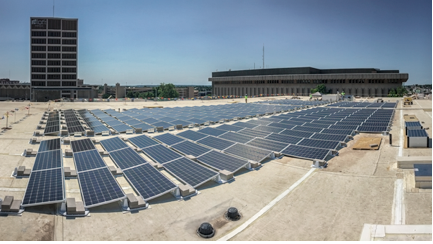
Geothermal Heat Pumps
FRE is also in the business of developing, engineering, drilling and installing geothermal heat pump systems is used for central heating and cooling in homes and commercial buildings. It is a simple technology, but for a variety of reasons, it has not taken off on a large scale in the US. You drill a hole (known as a borehole) down about three hundred feet on average and put high density polyethylene tubing in the holes with a U bend at the bottom. You then header all the holes together and circulate water through a heat exchanger to create heat for your home or business. In the summer months, the heat pump reverses the process and pulls heat from your home, injecting it back into the ground, thereby cooling your home or business. This process is much more efficient then using electricity to cool your home and a boiler, using gas, to heat your home. As a result, your electricity bills go down about 50% for cooling versus a normal air conditioner and the heat pump eliminates 100% of the cost of fuel to heat your home or business. What’s more, the boreholes will last in the ground virtually for hundreds of years, and the equipment in your home or business will last approximately 25 years (compared to air conditioner units and boilers which typically last 12-15 years. I have a 3-ton geothermal system at my home and my electric bill is never more than $120 (even in the summer months) and our monthly gas bill is $20 to $50 depending on how much we use our stove and hot water!
The primary impediment to the proliferation of geothermal is the high upfront capital cost to install (compared to the cost to install traditional HVAC units, but FRE is working hard to drive down costs. There are even new technologies coming in the next few years that will eliminate the need for a drilling rigs, which is another impediment, particularly for residential applicants. Many potential customers love the idea of geothermal, but have concerns with having a drill rig upend their landscapes, gardens, etc. Eliminating the need for a drilling rig addresses this concern. There are other advances in the industry, such as better geotechnical analyses that reduce the cost of drilling. We also believe that as geothermal proliferates, the cost of heat pumps and other associated equipment will come down dramatically, just as solar panel prices have been reduced dramatically due to increased competition in the marketplace. Besides mere cost, other issues in the industry impede its development. To date, there are few, if any, companies “developing” geothermal solutions. The industry has many engineers, drillers, installers and operators, but they all operate independently, resulting in unnecessary costs and the inevitable “finger pointing” when something goes wrong. FRE addresses this issue by integrating all of these disciplines under one company. This enables FRE to warranty the work and to control quality through the duration of the project. It also enables us to provide better pricing to the customer. We also offer financing solutions for customers who cannot afford the upfront costs. FRE will install the system at its own expense and then get paid back over time as the geothermal system generating energy savings. FRE is bullish on the geothermal potential in Oklahoma, which will create jobs, tax revenue for the state, and importantly, help eliminate carbon dioxide and other contaminants from our environment.
Below is a schematic describing how geothermal works:
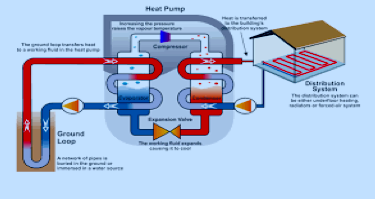
Managing a Startup
I want to grow FRE methodically and do it correctly. I saw how growing too rapidly could hurt a company from my experience with SunEdison, something that lead them into bankruptcy. So far, I haven’t had to raise outside equity and have been able to fund the projects we are developing through a working capital line of credit and my own money. But we are getting to the point where we are starting to do a lot of projects that are more capital intensive, thereby potentially requiring third-party capital.
When starting a business, the most important thing is to hire “committed” employees. I can tell from the first five minutes of an interview whether a candidate is committed and passionate about renewable energy, or whether he or she is just here to collect a paycheck. Companies that hire the latter will inevitably fail. FRE has been fortunate to hire 30+ employees in the last 18 months, all of whom are committed to the growth and success of the company (if they were not, they would not be employed by FRE!).
A new business owner also has to, as quickly as possible, gain credibility in the market. This is no easy task, as existing competitors will do everything in their power to see you fail.
One of the things I did to give the new company credibility was to get a number of energy industry experts on my advisory board, people I had connections with mostly through my Dad. The other way to get instant credibility is to outwork, outclass and outsmart our competitors. Customers will eventually take notice, even if it does not happen right away. FRE is committed to being the first-in-class solar and geothermal provider in the state. We are confident that our dedication and professionalism will reap dividends in the future.
How to Prepare Yourself in High School
- Most people in high school are like me, and they really do not know what they want to do in life. Even if you think at a young age that you want to be an engineer or a lawyer, or whatever (my five year old son wants to be an astronaut!), you will find out that life happens and you often later discover that you are passionate about something else. My advice is that you want to be as broad as possible for as long as possible and gradually whittle down as you gain experience. When you ultimately discover what you are passionate about, go for it. I was 36 years old before I discovered my passion (starting and growing a renewable energy business). If I would have just focused my life and career on being a lawyer, I would have missed a lot of opportunities and not found my passion.
- Focus on academic success. Work hard, and when encountering difficulties (everyone does), engage your teachers, parents, friends or mentors for help. Leaving high school with poor grades will make it a harder climb to success.
- It is important that you learn to work with a variety of people. Pursue extra-curricular activities that interest you, whether it is a sport or the arts. You can even start a small nonprofit and do charitable work. In Tulsa, there are tremendous mentoring resources available for students, including through the Tulsa Chamber of Commerce. This breadth of exposure will serve you well when in the professional world where you have to deal with all kinds of people every single day.
- Another thing that is important for high school students to understand is the increasing need for people with technical training. These careers can be a good alternative to going to a four-year college. Tulsa Tech and Tulsa Community College are free to high school students in Tulsa County and there are many free trade apprenticeships available. We have one project in Texas where we are required to hire our own master electrician. That job pays close to $100,000!
- If you want to go to a four year college and be an engineer, you can take pre-engineering at a magnet school like Memorial as well as at Tulsa Tech. There is a lot of demand for engineers in renewable energy and other STEM careers once you graduate. If you do well in these pre-engineering classes, you will find there are many more scholarships available for engineering students than other majors and well paid internships you can apply for after your second year of college.




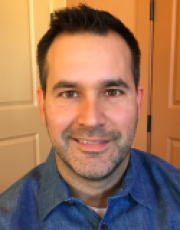
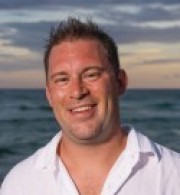
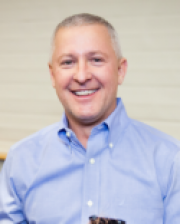
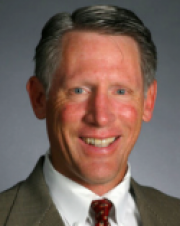
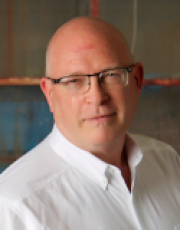
Mr Jankowsky seem to be a perfect fit for a mentor for myself. I am looking to start a business in renewable energy and have some ideas I would love to get his feedback on. His international business experience is also a plus, as I am also looking to do business in South Africa. Please let me know how I may have Mr Jankowsky as a business mentor.
Kind Regards,
Edward Laud